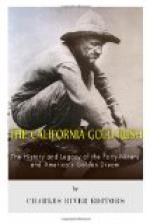Within an incredibly short time he had established a feudal barony at his fort. He owned eleven square leagues of land, four thousand two hundred cattle, two thousand horses, and about as many sheep. His trade in beaver skins was most profitable. He maintained a force of trappers who were always welcome at his fort, and whom he generously kept without cost to themselves. He taught the Indians blanket-weaving, hat-making, and other trades, and he even organized them into military companies. The fort which he built was enclosed on four sides and of imposing dimensions and convenience. It mounted twelve pieces of artillery, supported a regular garrison of forty in uniform, and contained within its walls a blacksmith shop, a distillery, a flour mill, a cannery, and space for other necessary industries. Outside the walls of the fort Captain Sutter raised wheat, oats, and barley in quantity, and even established an excellent fruit and vegetable garden.
Indeed, in every way Captain Sutter’s environment and the results of his enterprises were in significant contrast to the inactivity and backwardness of his neighbors. He showed what an energetic man could accomplish with exactly the same human powers and material tools as had always been available to the Californians. Sutter himself was a rather short, thick-set man, exquisitely neat, of military bearing, carrying himself with what is called the true old-fashioned courtesy. He was a man of great generosity and of high spirit. His defect was an excess of ambition which in the end o’erleaped itself. There is no doubt that his first expectation was to found an independent state within the borders of California. His loyalty to the Americans was, however, never questioned, and the fact that his lands were gradually taken from him, and that he died finally in comparative poverty, is a striking comment on human injustice.
The important point for us at present is that Sutter’s Fort happened to be exactly on the line of the overland immigration. For the trail-weary traveler it was the first stopping-place after crossing the high Sierras to the promised land. Sutter’s natural generosity of character induced him always to treat these men with the greatest kindness. He made his profits from such as wished to get rid of their oxen and wagons in exchange for the commodities which he had to offer. But there is no doubt that the worthy captain displayed the utmost liberality in dealing with those whom poverty had overtaken. On several occasions he sent out expeditions at his personal cost to rescue parties caught in the mountains by early snows or other misfortunes along the road, Especially did he go to great expense in the matter of the ill-fated Donner party, who, it will be remembered, spent the winter near Truckee, and were reduced to cannibalism to avoid starvation.[1]
[1: See The Passing of the Frontier, in “The Chronicles of America.”]




